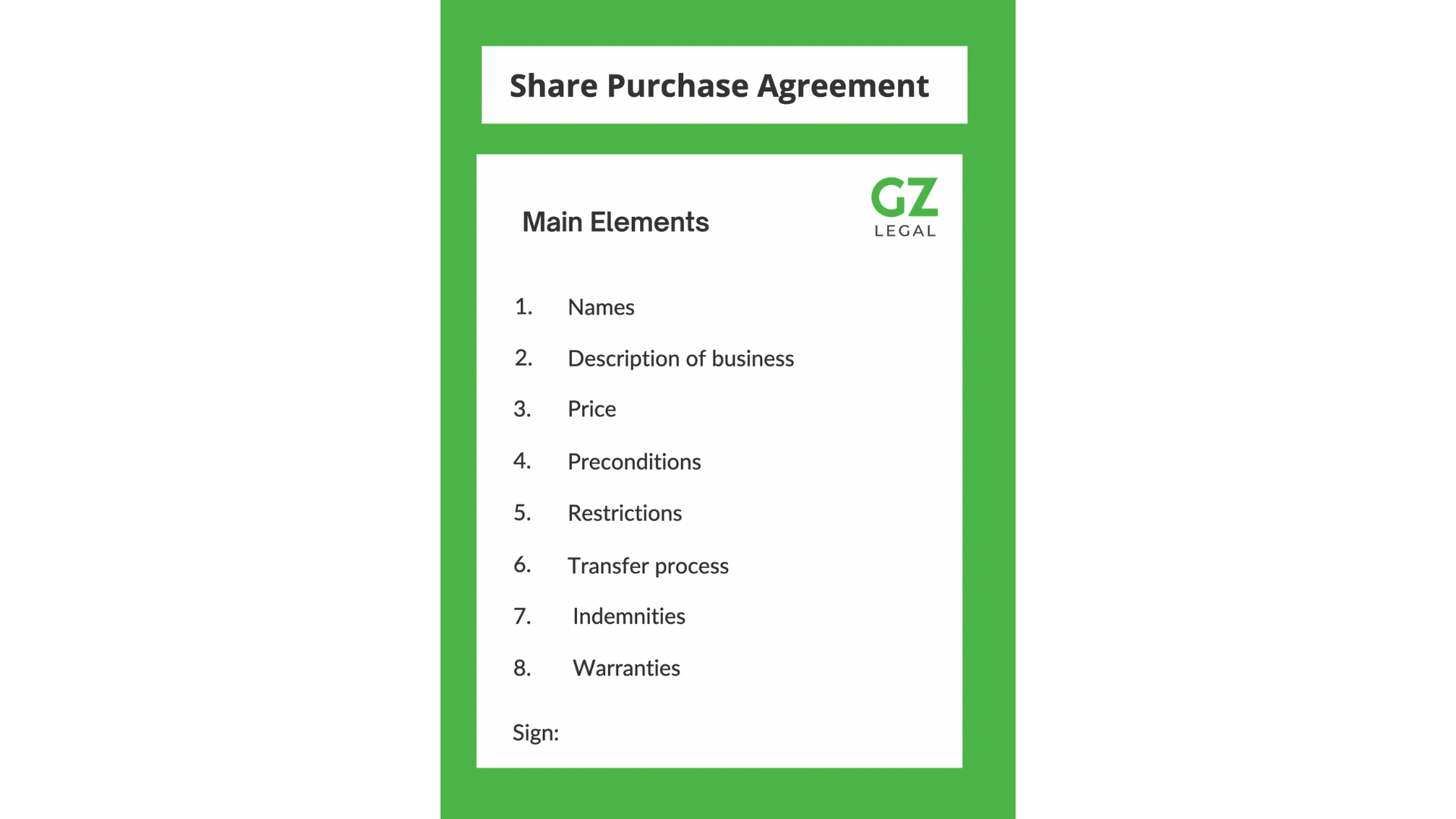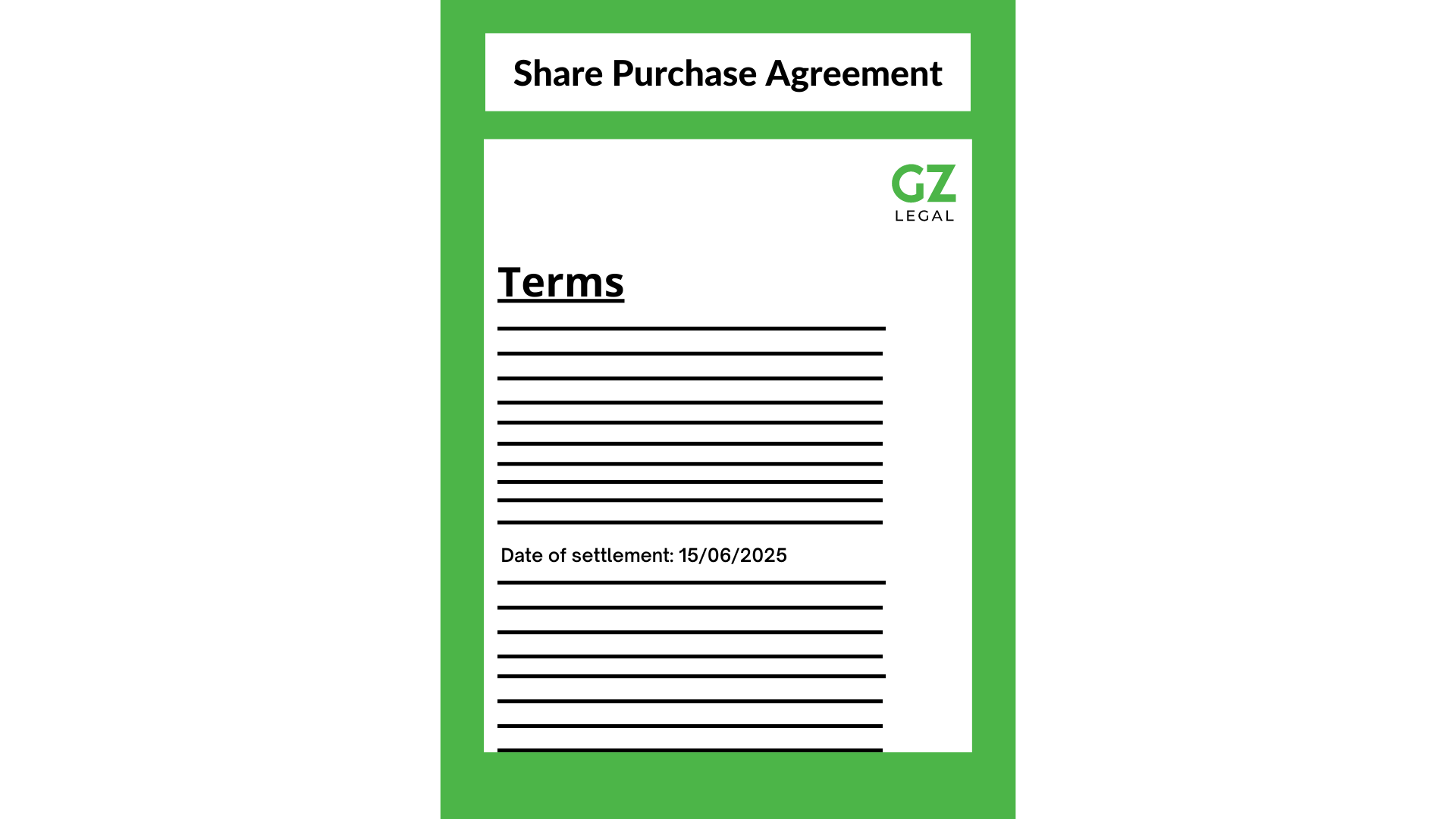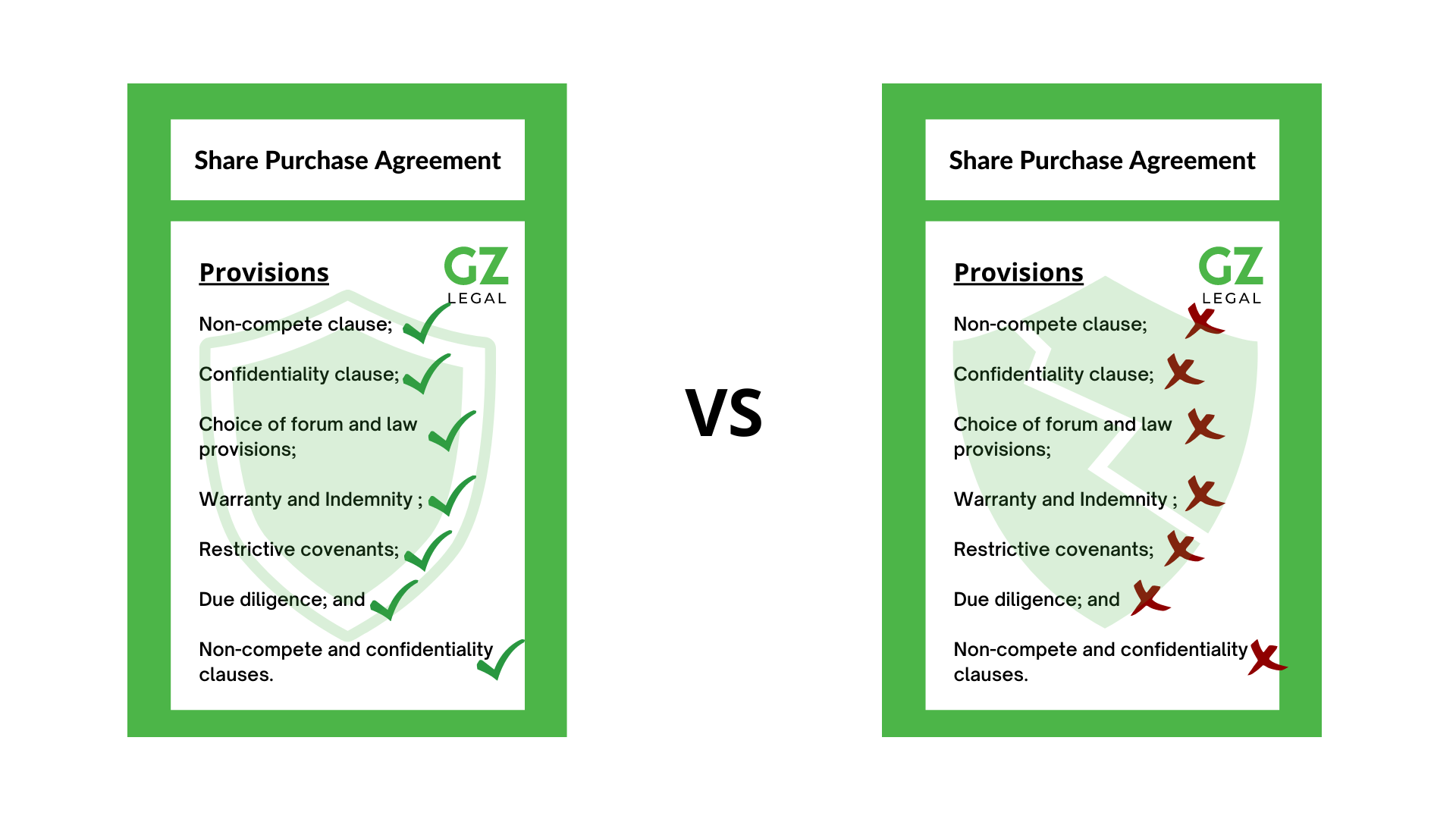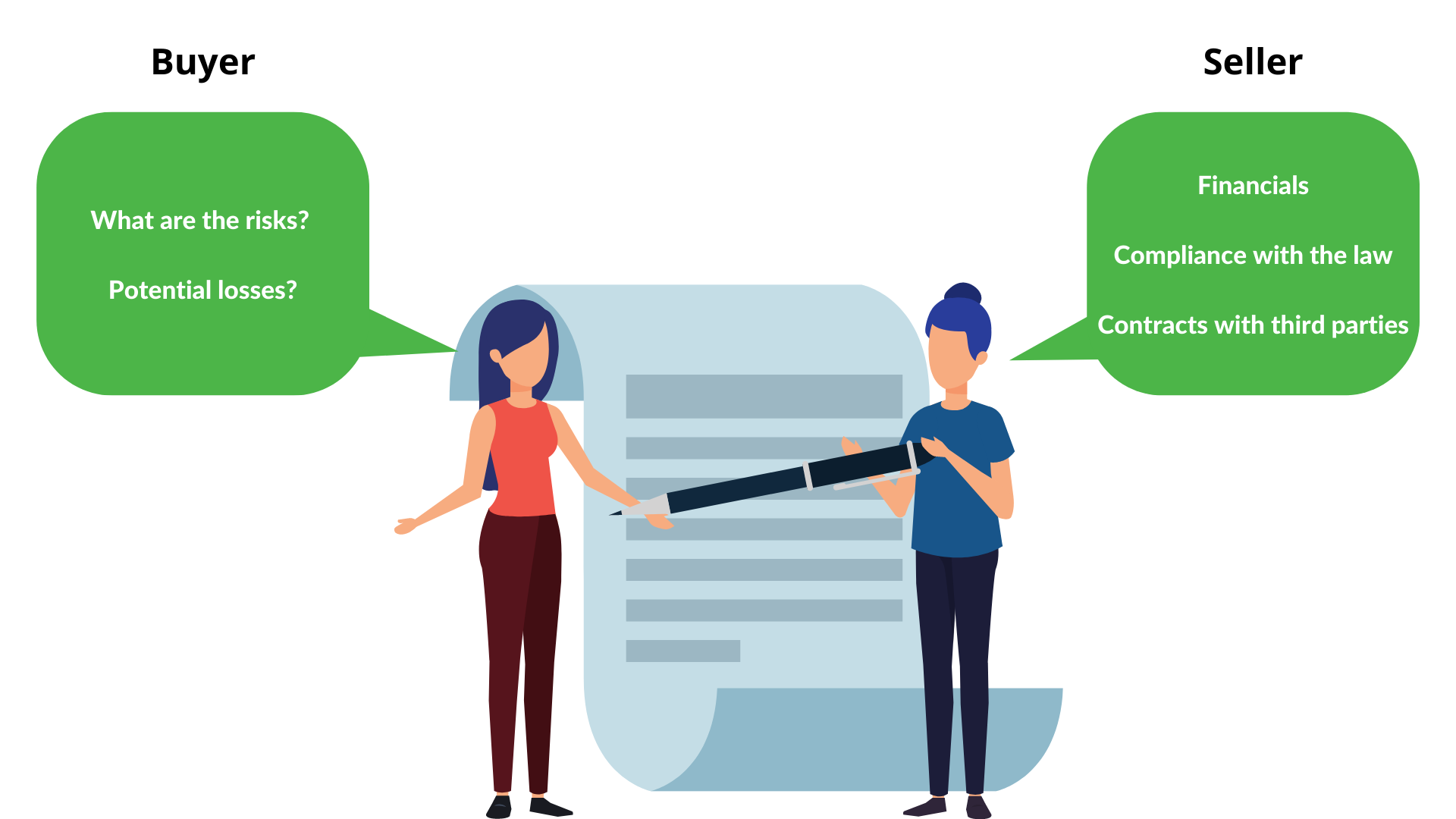Malcolm ZoppiSun Oct 15 2023
Share Purchase Agreements: Main Elements & Benefits
What Goes Into a Share Purchase Agreement? Is This The Right Document For You?
A share purchase agreement (SPA) is a legally binding document between a buyer and a seller that facilitates the purchase of shares by setting out the terms of the sale. The main purpose of a SPA is to protect the interests of both parties involved in the transaction. If the target company is large, the seller will likely consist of multiple shareholders. Therefore, more interests are in need of protection, demonstrating the need for a document governing such an acquisition.
If you’re selling or buying shares in a limited company, it’s important to have a SPA in place as it can help to protect you against any legal claims that may arise from the sale. A SPA can help to ensure that you get what you’ve paid for and that the seller can’t back out of the deal. The SPA overall sets out the obligations and rights of both parties in relation to the share purchase. It may also set out any restrictions following completion, but this will be discussed later in the article.
When a new shareholder acquires shares through an SPA, they may also become a party to the existing Shareholder Agreement, which will then govern their rights and obligations as a shareholder in the company.
Asset purchase or share purchase?
A share purchase agreement differs from that of an asset purchase agreement. An asset purchase agreement (APA) is typically used in transactions where the buyer is only interested in purchasing certain assets of the company, rather than the shares themselves. These assets could include things like property, equipment, or patents. On the other hand, under a SPA, the buyer will be acquiring all of the shares in a company as well as its assets. This means that the buyer will become a shareholder of the company and will be entitled to all of the rights that come with that status.
Depending on the property being sold under an APA, a seller could potentially be left with an empty shell of a company as a buyer may cherry-pick the assets they wish to purchase. This means any liabilities will be left with the seller despite the sale. Therefore, a SPA may be more attractive to clients who wish to sell their company in its entirety and walk away from the business completely.
The law guards both types of transfer differently and, as a result, both types of transactions have different tax liabilities. The legal implications of both types can be extreme, therefore it is important to seek specialised advice from a commercial solicitor or lawyer who will be able to help choose the right transfer for you.
Types of share purchase agreements
This article aims to discuss what SPAs look like broadly, therefore, it’s important to seek legal advice from a lawyer who specialises in corporate law before entering into any agreements.
The main elements of a share purchase agreement

There are several key provisions that should be included in a share purchase agreement. These include the following elements:
- The names and contact details of the respective parties;
- A description of the shares being sold;
- Details relating to the price of the shares;
- The date of settlement;
- Timetable for completion;
- Any conditions attached to the sale (eg. Seller’s warranties, board approval); and
- Signatures of both parties.
The names and contact details of the respective parties
Generally, only two parties are involved in a share purchase. A buyer and a seller. Both parties should each list their full name and contact details in the SPA. If the transaction is quite large, there may be a team on either side supplying contact details to help facilitate the acquisition. This will ensure that both parties can be easily contacted if there are any questions or issues regarding the agreement.
A description of the shares being sold
The SPA should include provisions relating to the description of the shares being sold, including the class of shares and the number of shares being transferred. This will help to identify the shares that are being sold under the agreement.
Details relating to the price of the shares
The purchase price of the shares should be clearly stated in the SPA. This will help to avoid any confusion or disagreement about the price at which the shares are being sold.
The date of settlement
The SPA should include the date on which the shares will be transferred from the seller to the buyer. This is known as the settlement date. It’s important to ensure that both parties are available on this date to sign the necessary paperwork and transfer the shares.

Timetable for completion
The timetable for completion sets out the date by which the buyer must complete the purchase of the shares. The date is usually set by the seller and may be subject to extension if the parties agree.
An extension may be requested if there are delays to shareholders’ consent to the sale and if a competitive authority believes that the transfer may put other companies at an unfair disadvantage. Most commercial law firms are specialised in providing advice if the latter issue is likely to occur in a transaction.
It is also important to note that the completion date is different from the date of exchange of contracts. The completion date is the day on which the buyer takes ownership of the shares and the date on which the seller, or sellers, cease to be shareholders. The date of exchange of contracts is the day on which the parties agree to the sale and purchase of the shares.
If the buyer fails to complete on the date specified in the share purchase agreement, the seller may be entitled to terminate the agreement and retain the deposit paid by the buyer. The buyer may also be liable for any losses incurred by the seller as a result of their failure to complete.
Any conditions attached to the sale
There may be certain conditions attached to the sale of shares, such as board approval or seller’s warranties. Some must be satisfied before the closing of the transaction can occur, these are known as conditions precedent. The conditions precedent may relate to specific actions that must be completed before any sale can go ahead. They can include actions such as:
- The shareholders approving the sale;
- Delivery of any necessary documents to both parties;
- The provision of seller’s warranties stating that the company is in good standing and has no material liabilities; and
- The completion of any necessary financing arrangements
After the buyer completes the purchase, some conditions may remain that limit their ability to resell or control the shares. It is also important to be aware of any liabilities that come with the shares being purchased. These could include environmental liabilities or financial liabilities and can have a significant impact on the buyer. As a result, the buyer should be made aware of these so that they can make an informed decision about whether or not to purchase the shares.
Signatures of both parties
Once both parties have agreed to the terms of the SPA, they should each sign and date it. This will signify their agreement to the terms of the sale and create a legally binding contract between the parties.
Provisions providing extra protection

In addition to the above, there are a number of other clauses which may be included in a share purchase agreement. These will depend on the specific circumstances of the transaction and the negotiation between the parties. Some common clauses include:
- Non-compete clause;
- Confidentiality clause;
- Choice of forum and law provisions;
- Warranty and Indemnity ;
- Restrictive covenants;
- Due diligence; and
- Non-compete and confidentiality clauses.
Non-compete clause
A non-compete clause is a legal provision that can be used to protect your company from the risk of future competition after completion. This clause typically prohibits the buyer from competing with your business for a certain period of time following the completion of the sale. A non-compete agreement might, for example, prevent a business owner from starting a rival company and poaching clients and employees.
Confidentiality clause
Meanwhile, a confidentiality clause can help to protect any sensitive information that is exchanged during the transaction. An example of such sensitive information may include documents identifying specific employees or agreements created with any suppliers. Post-completion, it is likely that documents of such a private nature will be destroyed or returned to their respective parties.
Confidentiality agreements, and even non-compete agreements, help to protect your company’s key assets. As the seller, you may want to ensure that any intellectual property remains with your business after the sale has been completed. This is because IP is a key asset to your business and can help it thrive in the future.
It is therefore important to have robust non-compete and confidentiality clauses in place to protect your business both during and after a sale. When it comes to negotiating and drafting these clauses, it is important to seek legal advice from a solicitor or lawyer who understands the needs of the commercial world. This is because the laws surrounding these clauses can be complex, and the consequences of getting them wrong can be serious.
Warranties and indemnities
Warranties and indemnities are key components of share purchase agreements and are typically negotiated between the seller and buyer before the SPA is signed. They are used to protect the buyer from any potential risks associated with the acquisition as well as post-completion, and to ensure that the seller is held liable for any issues that may arise after the sale.
Broadly, warranties and indemnities in a contract are intended to guard against problems such as:
– Misrepresentation
– Breach of contract
– Fraudulent misrepresentation
– Defects in title
– Environmental contamination
– Tax liabilities
– Pending litigation
Click here to learn more about the process of buying a business.
The seller’s warranties will provide details about the business being sold, including its financials, compliance with laws and regulations, and contracts with third parties. They usually take the form of a representation that the business is tax-compliant and therefore would provide a reliable partner to a transaction. A buyer could sue for damages if they experience a loss because of a breach of warranty.
The buyer’s indemnities, on the other hand, will protect them from any losses relating to the sale. The seller would agree to compensate the buyer if any liabilities come up following completion of the sale.
Any buyer should be aware of the risks associated with their purchase, especially in the case of an expensive acquisition. Because of this, it’s critical to obtain legal advice before signing a share purchase agreement since several complex legal concerns must be addressed.
These measures help buyers avoid risks associated with the buy while also ensuring that the seller is held responsible for any issues that develop after the transaction is completed. A law firm with experience in this sector can assist you during the negotiation and drafting of the SPA, ensuring that your interests are protected.

Choice of forum and law
Although only useful for deals occurring cross-jurisdictionally, this clause allows the parties to plan ahead by selecting the jurisdiction that will govern any legal disputes that may arise from the current contract. This means that, for example, a dispute would be resolved using English law if London was selected as the seat. This can save time and money if a dispute does occur, as the parties will already have agreed on the factors relating to how the dispute will be resolved and what law governs the contract.
Although a separate arbitration agreement would be a better document to contain such provisions, the courts can still use the content of the SPA to infer the party’s intentions when it comes to a dispute.
Restrictive covenants
A restrictive covenant in a SPA may act to restrict the actions of both parties before and after the closing of the contract. Restrictions placed on the activities of the buyer are designed to protect the seller’s business interests, while restrictions placed on the seller are designed to protect the buyer’s investment. They are typically included in the SPA to promote certainty and fairness in the transaction and protect each party’s interests.
The restrictions placed on the parties may include restrictions on the use of the other party’s intellectual property, restrictions on competition with the other party’s business, and restrictions on the solicitation of employees.
Due diligence
All purchases are made with a risk. The process of due diligence is vital as it allows a potential buyer to investigate the target company and the shares being purchased before committing to the deal. Solicitors and lawyers with the required commercial knowledge, will be given private access to the target company in order to investigate and identify any risks associated with the purchase to ensure that they are adequately addressed.
The due diligence process will vary depending on the industry and regulatory environment, but usually involves reviewing financial statements, interviewing management, talking to the company’s employees, and touring any facilities.
The private access provided by the process can help uncover any issues related to the company, including fraud and tax evasion. Therefore, the findings of due diligence may affect the transaction price, whether warranties and indemnities are included, and whether a buyer decides to continue with or cancel the transaction.
Furthermore, due diligence allows for the reallocation of risk by providing the buyer with a means to elicit information from the seller. This means that if due diligence is not conducted to a high standard, and something goes wrong post-completion, the seller may not be liable to fix it.
If due diligence is not conducted properly, it can lead to the risk of overpaying the purchase price or the potential emergence of issues following completion. Although it can be a very lengthy process due to the vast amount of documents involved, it is extremely vital in the commercial world due to the potential risk of legal and reputational repercussions.
Our team are specialised in providing advice to you throughout your transaction. If you wish to learn more, visit our website to hear from previous clients and take a look around to understand the type of advice we can provide to support you and your business. Our team are here for you.
The benefits of a share purchase agreement
This part of the article aims to summarise the number of benefits that a share purchase agreement can provide to both the buyer and seller. As demonstrated above, a share purchase agreement (SPA) is a useful tool in setting out the obligations of the buyer and seller whilst ensuring that the deal abides by the law. SPA’s provide a variety of benefits, some of which include:
- The protection of your interests in the event that something goes wrong with the transaction;
- Protection of potential liabilities;
- Prevents the buyer from setting up a competing business (if a non-compete clause is included);
- Can help to ensure that you are paid on time; and
- Can help to minimise any disputes that may arise
The following section of this article will explore the primary benefits in greater depth.
Protection of party interests
A SPA can provide you with peace of mind and help to ensure that the transaction of the shares goes smoothly. It safeguards both parties whilst outlining their responsibilities.
For the seller, it acts to protect the shareholder’s rights whilst enabling them to raise money for any future business endeavours.
The SPA also acts to protect the reputation and integrity of the buyer’s business during and after the transfer by allowing the investigation of the target company. This acts to prevent the purchase of a company that could have a massive reputational hit, inherently ensuring that the buyer remains in the best position possible throughout the sale.
Depending on the terms included, SPAs also provide protection to the party’s interests by placing legal restrictions on the parties that may extend to a period post-completion. These can act to prevent the setting up of a competing business, misrepresentation and the breach of any conditions relating to the sale. These inherently support the interests of each party respectively by preventing them from acting against each other.
Consequently, both parties will rest assured knowing their legal rights and responsibilities surrounding the shares being bought or sold will be protected.
Protection from potential liabilities
A warranty or indemnity in a SPA can transfer possible liabilities and the need to pay damages from one party to another. This inherently means that the SPA will help protect you and your company if an issue were to arise post-completion. The effect of this is not just financial, but reputational too, allowing for your company’s reputation to be protected if such an issue were to arise.
Prevention of disputes
When it comes to any disputes, either a breach in warranty or another clause, both parties will immediately know what the consequences of such a breach will be. This acts as an incentive to provide accurate information relating to the state of the company as the legal repercussions can be severe if a breach of warranty or misrepresentation were to occur.
Clarity and certainty of party obligations
An ideal SPA would be clear as to what the purchase price of the shares is and the legal repercussions that the parties will face if in breach. It will put forward the obligations and rights of each party respectively, thus allowing for clarity and certainty.
Although not relevant to acquisitions based solely within the United Kingdom, the use of a choice of forum and law clause will provide certainty to both parties over what laws will be used if a dispute were to arise. This allows the parties to understand what jurisdiction is guarding the share purchase agreement, inherently providing extra clarity over what laws and regulations the parties need to abide to.
Should I involve a share purchase agreement in my transaction?
Overall, a share purchase agreement is a crucial document to have in place when selling or buying shares. It can provide a number of benefits for both the buyer and the seller, such as protection from potential liabilities, prevention of disputes and a clear understanding of obligations. If you are thinking of selling or buying shares, it is important to seek legal advice from a law firm specialised in this area to ensure that your ideal SPA is put in place.
Succession planning
Succession planning is a strategic process that involves identifying and developing potential successors for key leadership positions within a company. It ensures the continuity of the business and its operations in the event of the departure, retirement, or death of key personnel. Succession planning can relate to Share Purchase Agreements (SPAs) in several ways:
- Ownership Transfer: In family-owned or closely-held businesses, succession planning may involve transferring ownership of the company to the next generation or other designated successors. An SPA can be used to facilitate this transfer, outlining the terms and conditions for the sale and purchase of shares from the current owner to the successor.
- Buy-Sell Agreements: A buy-sell agreement is a legally binding contract between business partners or shareholders that outlines the terms under which a departing owner’s shares will be bought by the remaining owners or the company itself. An SPA can be used to execute the buy-sell agreement when a triggering event occurs, such as the death, disability, or retirement of a shareholder.
- Key Person Insurance: Succession planning may involve obtaining key person insurance to protect the company from the financial impact of losing a key executive or shareholder. The insurance proceeds can be used to buy out the shares of the deceased or disabled shareholder, and an SPA can be used to formalise the share purchase transaction.
- Exit Strategy: Succession planning may also involve the sale of the entire business to a third party, such as a competitor or a private equity firm. In this case, an SPA can be used to outline the terms and conditions for the sale of the company’s shares to the buyer.
In summary, succession planning and Share Purchase Agreements can be related in various ways, depending on the specific circumstances and objectives of the company and its shareholders. An SPA can be a useful tool in executing a well-planned succession strategy, ensuring a smooth transition of ownership and leadership within the company.
Find out more!
If you want to read more in this subject area, you might find some of our other blogs interesting:
- Step-by-Step Guide on How to Transfer Shares to a Holding Company
- Breach of Settlement Agreement: Consequences and Remedies Explained
- Who Gets the Money When a Company is Sold?
- What is a Counter Offer in Contract Law? Explained Simply and Clearly
- Understanding the Costs: How Much Do Injunctions Cost in the UK?